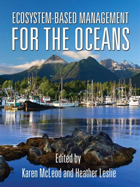2 books by Ruckelshaus, Mary

Ecosystem-Based Management for the Oceans
Edited by Karen McLeod and Heather Leslie
Island Press, 2009
Conventional management approaches cannot meet the challenges faced by ocean and coastal ecosystems today. Consequently, national and international bodies have called for a shift toward more comprehensive ecosystem-based marine management. Synthesizing a vast amount of current knowledge, Ecosystem-Based Management for the Oceans is a comprehensive guide to utilizing this promising new approach.
At its core, ecosystem-based management (EBM) is about acknowledging connections. Instead of focusing on the impacts of single activities on the delivery of individual ecosystem services, EBM focuses on the array of services that we receive from marine systems, the interactive and cumulative effects of multiple human activities on these coupled ecological and social systems, and the importance of working towards common goals across sectors. Ecosystem-Based Management for the Oceans provides a conceptual framework for students and professionals who want to understand and utilize this powerful approach. And it employs case studies that draw on the experiences of EBM practitioners to demonstrate how EBM principles can be applied to real-world problems.
The book emphasizes the importance of understanding the factors that contribute to social and ecological resilience —the extent to which a system can maintain its structure, function, and identity in the face of disturbance. Utilizing the resilience framework, professionals can better predict how systems will respond to a variety of disturbances, as well as to a range of management alternatives. Ecosystem-Based Management for the Oceans presents the latest science of resilience, while it provides tools for the design and implementation of responsive EBM solutions.
At its core, ecosystem-based management (EBM) is about acknowledging connections. Instead of focusing on the impacts of single activities on the delivery of individual ecosystem services, EBM focuses on the array of services that we receive from marine systems, the interactive and cumulative effects of multiple human activities on these coupled ecological and social systems, and the importance of working towards common goals across sectors. Ecosystem-Based Management for the Oceans provides a conceptual framework for students and professionals who want to understand and utilize this powerful approach. And it employs case studies that draw on the experiences of EBM practitioners to demonstrate how EBM principles can be applied to real-world problems.
The book emphasizes the importance of understanding the factors that contribute to social and ecological resilience —the extent to which a system can maintain its structure, function, and identity in the face of disturbance. Utilizing the resilience framework, professionals can better predict how systems will respond to a variety of disturbances, as well as to a range of management alternatives. Ecosystem-Based Management for the Oceans presents the latest science of resilience, while it provides tools for the design and implementation of responsive EBM solutions.
[more]

Strangers in Paradise
Impact And Management Of Nonindigenous Species In Florida
Edited by Daniel Simberloff, Don C. Schmitz, and Tom C. Brown; Foreword by Edward O. Wilson
Island Press, 1997
Invasive nonindigenous species -- plants and animals that have been introduced to an ecosystem from someplace else -- are wreaking havoc around the globe. Because they did not co-evolve with species already in the ecosystem, they can profoundly disturb species interactions and ecosystem function.The state of Florida has one of the most severe exotic species problems in the country; as much as a quarter of many taxa in Florida are nonnative, and millions of acres of land and water are dominated by nonindigenous species. Strangers in Paradise provides an in-depth examination of the Florida experience and of the ongoing efforts to eradicate or manage introduced species. Chapters consider: natural disturbance and the spread of nonindigenous species case studies of insects, freshwater invertebrates, fishes, amphibians and reptiles, birds, marine invertebrates and algae, and mammals methods of managing nonindigenous species including ecological restoration, eradication, "maintenance control," and biological control management on public lands the regulatory framework including the role of the federal government as well as state authorities and responsibilities Strangers in Paradise is the first comprehensive volume to address a large, diverse region and the full range of nonindigenous species, the problems they cause, and the methods and impediments to dealing with them. Throughout, contributors emphasize solutions and relate the situation in Florida to problems faced by other states, making the book an important guide for anyone involved with control and management of invasive species.
[more]
READERS
Browse our collection.
PUBLISHERS
See BiblioVault's publisher services.
STUDENT SERVICES
Files for college accessibility offices.
UChicago Accessibility Resources
home | accessibility | search | about | contact us
BiblioVault ® 2001 - 2024
The University of Chicago Press









